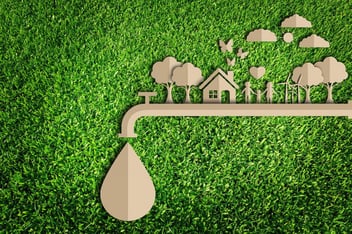Water industry shares feedback on COVID-19 impacts
Apr 17, 2020
|
3 mins read
 by Australian Water Association
by Australian Water Association
![]()
The Australian Water Association (AWA) recognises the broad impacts on members, other sectors and the community as a result of COVID-19.
As Australia’s peak national water association, AWA President Carmel Krogh OAM and CEO Jonathan McKeown have been invited to join the industry advisory group Utilities Work Stream, which reports to the COVID-19 Coordination Commission.
AWA has established a mechanism for members to share their own COVID-19 issues and recommendations throughout the crisis. A summary of the feedback is provided below.
What types of work practices or work outcomes have been impacted by COVID-19?
- There needs to be some clear definition of essential services that applies across state borders.
- Site maintenance teams are now reduced to single person operations, meaning the jobs take longer to do, but the work is getting done.
- Without a strong commitment from the water authorities to continue delivery of their capital works programs, the downstream local supply chains (consultants, contractors and suppliers) will all be affected.
- A lot of projects have been cancelled or delayed due to travel restrictions and/or financial uncertainty, which is having a huge impact on business.
- The supply chain of components from overseas has had some challenges.
- Some contractors have reduced teams to two-person crews where possible and have implemented hygiene and cleaning protocols. This is reducing productivity and increasing time for jobs.
- Some difficulty working from home due to issues with technology, availability of equipment and resources.
What areas of activity are you having trouble in accommodating social distancing?
- A big issue has been re-jigging manufacturing processes into physically separate, isolated areas and then into single-person operations in those areas. It has forced rewriting of quality control documentation, changed work processes and the like.
- Operations, maintenance and repair of a piece of equipment that requires more than one person to do the task is another issue.
- There has been a lot of difficulty in carrying out site work.
- With products that are new to the Australian market, it is harder for face-to-face demonstrations to allow people to fully understand the products, benefits and limitations.
How are you utilising Personal Protective Equipment (PPE) or other measures to mitigate COVID-19 risks where social distancing is not possible?
- Factory and on-site work processes have been moved into separate isolated work areas with limited personal interaction.
- Implementation of stricter daily disinfection regimes for all common areas, kitchens, toilets, etc. and any jointly trafficked areas.
- Most employees are working from home. People still working in the office are on a shifting roster.
- PPE is being used for the handling of incoming goods.
- No longer conducting customer visits and are investigating opportunities for webinars or other platforms to allow interactive presentations to contractors and operators.
- Reducing contact with couriers by limiting dispatches to a small number of days per week.
- Washing employees’ clothes at work to reduce risk of infection being taken home.
- Staggered start times or using a different location for each working group.
- Encouraging employees to travel directly to a site on their own using using their own private vehicles rather than meeting up at a depot.
Are there any other immediate respond and act issues that you would like AWA to bring to the attention of government?
- Better arrangements for state border passes for essential personnel who live in one state and work in another.
- A stronger commitment from the water authorities to release more projects to downstream supply chains, even if they are feasibility/functional designs.
- Clarity on whether irrigation infrastructure operators (e.g. not municipal water utilities) would be classed as essential if further work restrictions are implemented.
- A lot of the stimulus money has gone into making sure we are not going backwards but not a lot seems to have gone towards how we move forwards. R&D expenditure and growth enabling projects should be ramped up so that when we do emerge out of this, we emerge stronger.
- It is important that we have consistency across states and jurisdictions. Lack of consistency generates confusion and uncertainty across the workforce, suppliers and consumers as a whole and thereby reduces public confidence.
- Care must be taken not to excessively delay maintenance programs as the knock-on effects will include increased failure rates and increased cost of repairs and maintenance.
- Some of the Police crackdown on travel and distancing is very disorganised and divergent from the views of health ministers.
What other recommendations do you want AWA to advocate for to help the water industry through an extended COVID-19 crisis?
- Australian water utilities should spend money with Australian manufacturing companies as a required first preference instead of sending business offshore. With the current overseas travel restrictions, it is important to promote our Australian services and products and help Australian companies stay in business.
- It is important for the government to not cut costs and capital budgets in the essential service of water so all can contribute to keep the economy flowing with projects that add lasting value to the community.
- Stimulus money invested in water-related projects would be very well spent and set the industry up for future growth.
- There has already been a spike in sewer blockages due to consumers flushing wet wipes and other things that shouldn't be flushed. The government needs to establish a public awareness campaign for people to flush only toilet paper to prevent avoidable blockages and reduce unnecessary pressure from the networks.
- Bringing forward some of the infrastructure investment projects to ensure there are projects in the pipeline allowing direct investment into the economy when life starts returning to some sort of 'normality'. Design or planning work can be initiated now which will keep the momentum going. Projects may be related to drought-proofing, especially related to farmers or rural areas, providing multiple long-term benefits for the economy.
- Certificates for staff and consultants to show that essential work is being carried out and it is permissible for those essential workers to travel.


